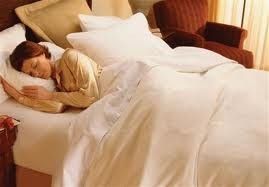World Sleep Day: 10 Commandments for a Sound Sleep

The very sight of bed will make some drowsy, but there are some unfortunate who lie down for hours and still not get a good sleep.
Are you haunted by sleep-related problems? Just listen and follow the instructions recommended by the World Sleep Organization which observes March 16 as the World Sleep Day.
During the fifth-annual World Sleep Day, organized by the World Sleep Committee, the World Association of Sleep Medicine (WASM) will be promoting the importance of having a healthy sleep to the public.
Sleep has a key role to play in the mental, physical and emotional health of adults and children. The World Sleep Day is designed to spread awareness of sleep as a human privilege.
Both clinical sleep problems and poor sleep habits affect the quality sleep in adults and children.
Sleep related problems like insomnia, restless legs syndrome (RLS), sleep deprivation and sleep-related respiratory disturbances such as obstructive sleep apnea (OSA) affect up to 45 percent of the world's population.
These problems result in loss of quality sleep that can lead to more health problems such as hypertension, heart disease, stroke and diabetes.
Insufficient sleep may lead to poor alertness, lack of attention, reduced concentration, decreased work and academic productivity and even road accidents.
A major focus of World Sleep Day 2012 is obstructive sleep apnea (OSA), which has become a very common and under- recognized problem nowadays.
The Wisconsin Sleep Cohort Study estimated an OSA prevalence of 24 percent among men and 9 percent among women in the U.S. In North India, OSA prevalence is about 13.7 percent.
With an accurate diagnosis, both pediatric and adult sleep apnea can be taken care of and cured. The methods of treatment varies from non-invasive procedures such as Continuous Positive Airway Pressure or CPAP (which will deliver air at a predetermined pressure through a mask placed over the nose) to oral appliances designed to keep the throat open and surgery to remove excess tissue from the throat or enlarge the oral container by means of maxillomandibular advancement.
Successful correction of sleep apnea can drastically improve sleep quality and overall health.
To solve the problem of poor sleep habits in adults and improve the quality of sleep, the World Sleep Day suggests its 10 Commandments of Sleep Hygiene for Adults. They are:
1. Establish a regular bedtime and waking time.
2. If you are in the habits of taking siestas, do not exceed 45 minutes of daytime sleep.
3. Avoid excessive alcohol ingestion 4 hours before bedtime, and do not smoke.
4. Avoid caffeine 6 hours before bedtime. This includes coffee, tea and many sodas, as well as chocolate
5. Avoid heavy, spicy, or sugary foods 4 hours before bedtime. A light snack before bed is acceptable.
6. Exercise regularly, but not right before bed
7. Use comfortable, inviting bedding.
8. Find a comfortable sleep temperature setting and keep the room well ventilated
9. Block out all distracting noise and eliminate as much light as possible.
10. Reserve your bed for sleep and sex, avoiding its use for work or general recreation.
About 25 percent of children in the world are also affected with poor quality sleep.
World Sleep Day offers a list of 10 Commandments of Healthy Sleep for Children. They are:
1. Make sure your child gets enough sleep by setting an age-appropriate bedtime and wake-up time.
2. Set consistent bedtime and wake-up times on both weekdays and weekends.
3. Establish a consistent bedtime routine that includes quiet time.
4. Encourage your child to fall asleep independently.
5. Avoid bright light at bedtime and during the night (including light from television or computer screens) and increase light exposure in the morning.
6. Keep all electronics, including televisions, computers and cell phones, out of the bedroom and limit use of electronics before bedtime.
7. Maintain a regular daily schedule, including consistent mealtimes.
8. Have an age-appropriate nap schedule.
9. Ensure plenty of exercise and time spent outside during the day.
10. Eliminate foods and beverages containing caffeine.
© Copyright IBTimes 2025. All rights reserved.





















